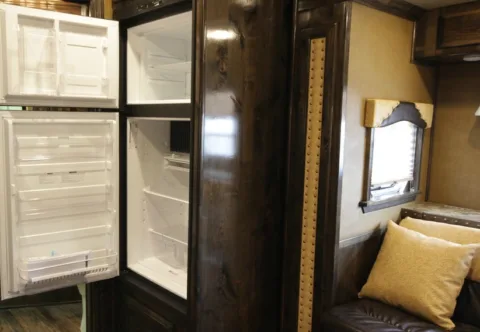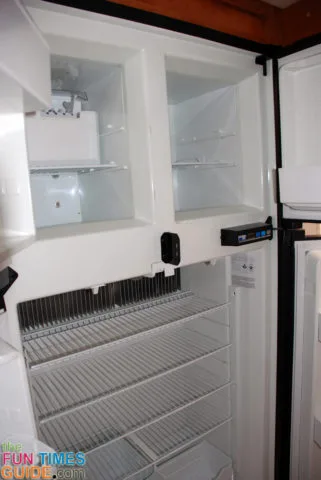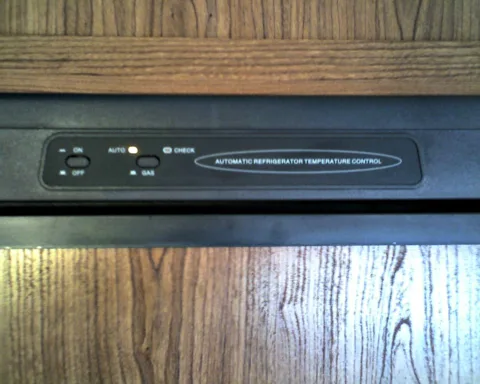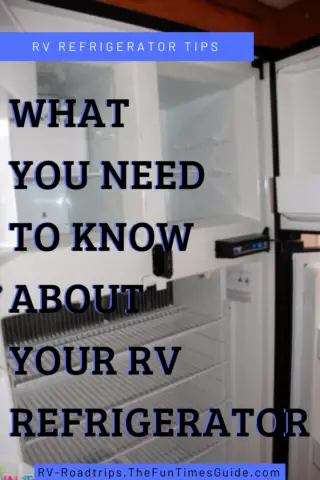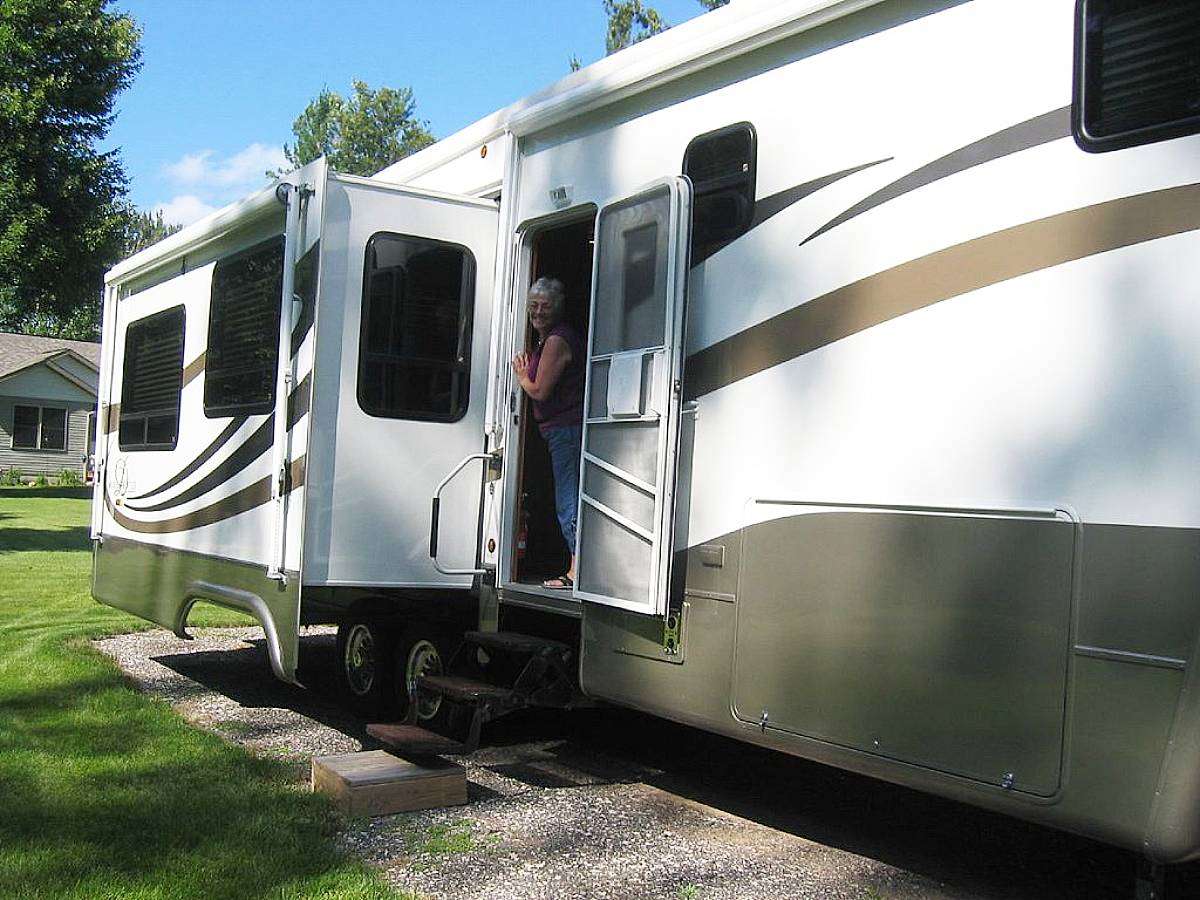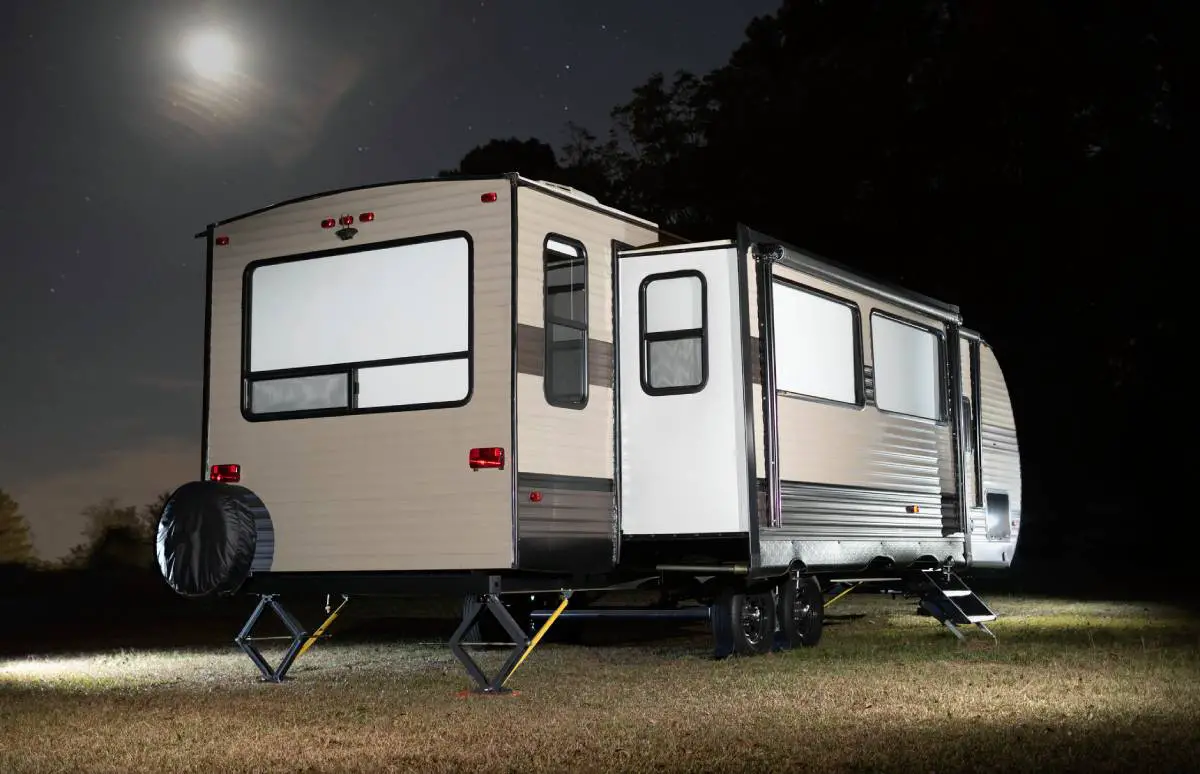It seemed so simple when they showed you how to use the RV refrigerator the first time.
But, in reality, it isn’t all that easy.
There’s more to it than just putting the switch in the ON position.
An RV refrigerator has some unique quirks about it!
And RV refrigerator parts are rather unique as well.
Here’s what you need to know if you want everything in the refrigerator to be cold before you hit the road…
RV Refrigerator Models
RV refrigerators come in 2 configurations:
- 3-way RV refrigerators – which will operate on 12-volt DC, 110-volt AC, and propane gas.
- 2-way RV refrigerators – which are more common and operate on 110-volt AC and propane.
Here’s a little about the differences between 2-way vs 3-way refrigerators.
Leveling Your RV Is The First Requirement
So you have the RV sitting in the driveway, and you need to pack everything for a trip tomorrow. What’s the best way to get things cooled down — so your beverages are ready to drink when you pull out of the driveway?
Your first concern should be to get your RV level. RV refrigerators will not cool unless they are darn near perfectly level!
The best way to determine how close to level you are is to stick a small bubble level inside the refrigerator itself. Relying on a level attached to the exterior of your RV may not be as accurate, depending on how the refrigerator is mounted in your RV.
You can actually damage your RV fridge if it’s too far off level.
How Level Does An RV Refrigerator Need To Be?
This video explains the “forgiveness level” of RV refrigerators:
So… your refrigerator has to be within 3 degrees off level side-to-side and within 6 degrees off level front-to-back.
Why RV Refrigerator Parts Are Unique
An RV refrigerator needs to be level to allow the solution inside the cooling unit to percolate — this is how it transfers heat out of the interior. (The solution consists of Sodium Chromate mixed with ammonia, hydrogen, and water.)
Just like in a coffee pot, heat is used to create the percolation action.
When you’re plugged in and operating off household 110-volt AC electricity, a heating element heats the fluid and creates circulation:
- If you have a 30-amp receptacle available at home with the same prong configuration as your RV power cord, you will have no problem using this source of power to operate your refrigerator.
- If you’re running an extension cord across the yard to reach your RV, keep in mind that your power source may not allow the heating element to get hot enough to do the job. You’re better off running on propane at this point.
How To Start An RV Refrigerator On Propane
To start your refrigerator on propane, for many models it’s as easy as flipping the switch to GAS:
There is one potential problem: If your RV has been shut down and stored for any length of time, that means the gas lines are empty and your refrigerator is not going to light the first time you flip the switch. In fact, you might have to flip the switch from OFF to GAS and back for quite some time before it will actually light.
When you open the valve on your propane tank, the easiest way to purge a good portion of the air out of the gas line is to light a burner on the stove. The stove has a big flame, and the gas line that supplies it is good-sized as well. The burner may take a minute or two to bleed off the air — but once it’s burning you have brought the gas supply much closer to the refrigerator.
Now, you can cycle the switch on the refrigerator to the GAS position, and after 3 or 4 tries it should light. It may still take more attempts — but no matter what, you have greatly shortened your time before achieving success.
If your refrigerator doesn’t have an electronic ignition, you will need to hold in the pilot knob until you have ignited the flame. Once you have a flame, continue to hold the button in for 30 seconds until the thermocouple senses the flame.
Refrigerators with the 12-volt DC feature can be operated in this mode when driving — to conserve propane and avoid any danger that operating on propane may present while traveling.
TIP: One thing to remember… The drain on your RV battery will be extensive when operating on 12-volt DC. If you turn off your motor to go shopping or sightseeing for a couple hours, you’re likely to have a dead battery when you return.
So there you have it… As long as you start your refrigerator the evening before you plan on loading it, you will find it nice and cold when you’re ready for your trip!
Can You Drive An RV With The Refrigerator Running On Propane?
Yes.
Personally, I’ve traveled all over the country with my refrigerator running on propane without any problems.
In most cases, you will find your refrigerator will operate better and cool much more efficiently on propane, too.
More About RV Refrigerator Parts
In addition to the links I’ve included above, here are some other resources to help you understand (and fix!) your RV refrigerator:
- How To Clean & Service An RV Refrigerator
- How To Diagnose RV Refrigerator Problems Yourself
- Tips For Repairing vs Replacing An RV Refrigerator
- How To Remove & Prevent RV Refrigerator Mold
Like this post? Save it to read again later… or share with others on Pinterest!
I’ve been involved in RVing for over 50 years — including camping, building, repairing, and even selling RVs and motorhomes. I’ve owned, used, and repaired almost every class and style of RV ever made. I do all of my own repair work. My other interests include cooking, living with an aging dog, and dealing with diabetic issues. If you can combine a grease monkey with a computer geek, throw in a touch of information nut and organization freak, combined with a little bit of storyteller… you’ve got a good idea of who I am. To date, I’ve shared my RV knowledge in over 300 articles here at The Fun Times Guide! Many of them have over 25K shares.

